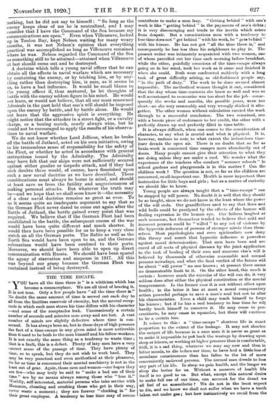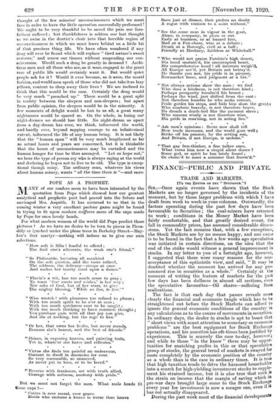THE TIME ESCAPE.
" YOU have all the time there is " is a witticism which has become a commonplace. We are all tired of hearing it. It is not true. Only a few people have "all the time there is." No doubt the same amount of time is served out each day to all from the limitless reservoir of eternity, but the mental recep- tacle in which each man stores his time differs with his character —and some of the receptacles leak. Unconsciously a certain number of seconds and minutes ooze away and are lest. A vast number of minds are slightly defective where time is con- cerned. It has always been so, but in these days of high pressure the fact of a time-escape in any given mind is more noticeable than it used to be both to the man himself and his fellow-workers. It is not exactly the same thing as a tendency to waste time ; that is a fault, this is a defect. Plenty of lazy men have a very correct sense of the passage of time. They have plenty of tune, so to speak, but they do not wish to work hard. They may he very punctual and even methodical at their pleaeures, bo far as time is concerned their mental machinery is not in the least out of gear. Again, those men and women—one hopes they are few—who may truly be said to "make a bad use of their tuns " are by no means always among those who "lose it." Worldly, self-interested, material persons who take service with Mammon, cheating and crushing those who get in their way, never waste a moment ; they are forever "clocking in" for their great employer. A tendency to lose time may of course
contribute to make a man lazy. "Getting behind" with one's work is like "getting behind" in the payments of one's debts ; it is very discouraging and tends to the inertia which arises from despair. But a conscientious man with a tendency to lose time does not " get behind " with his work, he " gets behind"
with his leisure. He has not got "all the time there i13," and
consequently he has leas than his neighbours to play in. The present writer was intimately acquainted with two women, one
of whom parcelled out her time each morning before breakfast, while the other, painfully conscious of the time-escape always going on in her mind, took her work as it came and finished it when she could. Both were confronted suddenly with a long task of great difficulty arising, as old-fashioned people say, " in the path of duty." The work to be done seemed almost impossible. The methodical woman thought it out, considered that the day whose time-contents she knew so well and was so well accustomed to economize was too short for the job-- conse- quently the weeks and months, the possible years, were too short—so she very reasonably and very wrongly shirked it alto- gether. The other woman without calculation carried the work through to a successful conclusion. The two remained, one with a heroics piece of endurance to her credit, the other with a perfectly drawn up and perfectly filled in time-table.
It is always difficult, when one comes to the consideration of character, to say what is mental and what is physical. It is, however, curious to note to what extent the industrious tine. loser dreads the open air. There is no doubt that so far as brain-work is concerned time escapes more abundantly out of doors. Many people cannot give their attention to what they are doing unless they are under a roof. We wonder what the experience of the teachers Who conduct "summer schools" in school gardens and playgrounds is in this matter Can the children work ? The question is not, so far as the children are concerned, an all-important one. Health is more important than Instruction for little boys and girls ; but as a matter of curiosity we should like to know.
Young people are always taught that a " time-escape " can be stopped by will power. No doubt it is well that they should be so taught, since we do not know in the least where the power of the will ends. Our grandfathers used to say that lions and wild bulls could be paralyzed by the effects of the human will finding expression in the human eye. Our fathers laughed at such nonsense, but themselves tended to believe that mild and innocent persons could be " willed " to any net of violence by the hypnotic influence of persons of stronger minds than them- selves. Most psychologists and even spiritualists now deny this theory and assert that hypnotic influence is powerless against moral determination. That men have been and arc cured of all sorts of physical diseases by the joint application to the task of healing of their own and someone else's will is believed by thousands of otherwise reasonable and normal persons nowadays, and what the final verdict of the future will be about "will power" no one knows ; at present there seems no demonstrable limit to it On the other hand, this much is certain ; however much the exercise of the will can do, it very seldom does alter either the physical constitution or the mental temperament. In the former case it is not without effect upon health ; in the latter it has at most a moral compensatory action powerful perhaps to save a man's soul but not to alter his characteristics. Even a child may teach himself to forgo his leisure ; but if ho has a real tendency to lose time ho will hardly teach himself to conserve it. Ho may cease to pro- crastinate, he may cease to squander, but there will continue to be a certain loss.
It comes to this : a. " time.escape " shortens life in exact proportion to the extent of the leakage. It may not shorten the output of life because in a sane man it /8 never so great as to make it impossible to put back the wastage by drawing upon sleep or leisure, or working at higher pressure than is comfortable, Still, it is a sad thing, whatever we may say now and then in bitter moods, to die before our time, to have had a little less of mundane consciousness than has fallen to the lot of more conveniently endowed persons. The normal man dreads to lose any part of his life. In sleep we gain health, and the longer we sleep the better for us. Without a measure of health life itself is no good to us. But what, except this natural desire to make full use of our time, can account for the dread we all feel of an anaesthetic ? We do not in the least expect; to die, and we know we shall not suffer when we have a tooth taken out under gas; but how instinctively we recoil from the thought of the few minutes' unconsciousness which we must face in order to have the little operation successfullyperformed We ought to be very thankful to be saved the pain our fore- fathers suffered ; but thankfulness is seldom our last thought as we swim in the dentist's chair into that horrible region of unconsciousness in which we must leave behind us a little bit of that precious thing life. We have often wondered if any drug will ever be found which will replace "tired nature's sweet restorer," and renew our tissues without suspending our con- sciousness. Would such a drug be greatly in demand ? Ambi- tious men and all those who are, as it were, engaged in the great race of public life would certainly want it. But would quiet people ask for it ? Would it ever become, as it were, the moral fashion, and would men speak of those who did not take it as lazy fellows, content to sleep away their lives! We are inclined to think that this would be the ease. Certainly the drug would be very much "preached up." There would be a great split in society between the sleepers and non-sleepers; but apart from public opinion, the sleepers would be in the minority. A few moments of delight would be lost to us all, a great many nightmares would be spared us. On the whole, in losing our night-dreams we should lose little. No night-dream as apart from a day-dream has ever, we think, influenced the world, and hardly ever, beyond sapping courage to an infinitesimal extent, influenced the life of any human being. It is not likely that the "human span" will be very much lengthened so far as actual hours and years are concerned, but it is thinkable that the hours of unconsciousness may be curtailed and the human hunger for time be thus assuaged. "Let us hope not," we hear the typo of person cry who is always raging at the world and declaring he hopes not to live to be old. The type is excep- tional though noisy. The ordinary man, whatever his views about human misery, wants "all the time there is "—and more.







































 Previous page
Previous page